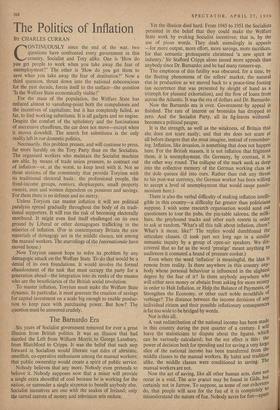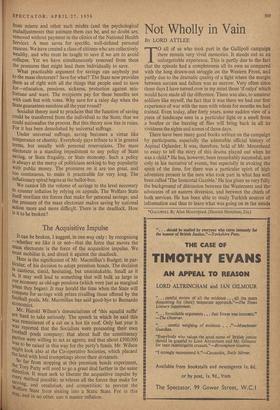The Politics of Inflation
BY CHARLES CURRAN CONTINUOUSLY since the end of the war, two questions have confronted every government in this country. Socialist and Tory alike. One is 'How do you get people to work when you take away the fear of unemployment?' The other is 'How do you get them to save when you take away the fear of destitution?' Now' a third question, thrust down into the national subconscious for the past decade, forces itself to the surface—the question `Is the Welfare State economically viable?'
For the mass of the population, the Welfare State has reduced almost to vanishing-point both the compulsions and the incentives of capitalism; but it has completely failed, so far, to find working substitutes. It is all gadgets and no engine. Despite the comfort of the upholstery and the fascinations of successive chauffeurs, the car does not move—except when it moves downhill. The search for substitutes is the only reality left in our domestic politics.
Necessarily, this problem presses, and will continue to press, far more harshly on the Tory Party than on the Socialists. The organised workers who maintain the Socialist machine are able, by means of trade union pressure, to contract out of inflation—or. at the worst, to keep level with it. Not so those sections of the community that provide Toryism with its traditional electoral basis : the professional people, the fixed-income groups, rentiers, shopkeepers, small property owners, men and women dependent on pensions and savings. For them there is no defence and no mercy.
Unless Toryism can master inflation it will see political paralysis spread gradually throughout the body of its tradi- tional supporters. It will run the risk of becoming electorally moribund. It might even find itself challenged on its own ground by Liberal or other demagogues trafficking in the miseries of inflation. (For in contemporary Britain the raw materials of demagogy are in the middle classes, not among the manual workers. The starvelings of the Internationale have moved house.) Now Toryism cannot hope to solve its problem by any demagogic attack on the Welfare State. To do that would be a denial of its own foundations. It would involve the formal abandonment of the task that must occupy the party for a generation ahead—the integration into its ranks of the masses who are the beneficiaries of the British social revolution.
To master inflation, Toryism must make the Welfare State dynamic. In particular, it must generate the creation of savings for capital investment on a scale big enough to enable produc- tion to keep pace with purchasing power. But how? The question must be answered crudely.
The Barnardo Era
Six years of Socialist government removed for ever a great illusion from British politics. It was an illusion that had dazzled the Left from William Morris to George Lansbury, from Blatchford to Cripps. It was the belief that each step forward in Socialism would liberate vast tides of altruistic, unselfish, co-operative enthusiasm among the manual workers; that public ownership would create a spirit of public service.
Nobody believes that any more. Nobody even pretends to believe it. Nobody supposes now that a miner will provide a single extra shovelful of coal because he is working for the nation, or surrender a single sixpence to benefit anybody else. Socialist incentives are one with the snakes of Ireland; only the carnal carrots of money and television sets endure. Yet the illusion died hard. From 1945 to 1951 the Socialists persisted in the belief that they could make the Welfare State work by evoking Socialist incentives; that is, by the use of pious words. They dealt unendingly in appeals —for more output, more effort, more savings, more sacrifices, for that semantic grotesquerie christened 'a new spirit in industry.' Sir Stafford Cripps alone issued more appeals than anybody since Dr. Barnardo; and he had many runners-up.
The emptiness of this futility was obscured, for a time, by the fleeting phenomena of the sellers' market, the natural rise in production as we moved back to a peace-time footing (an occurrence that was presented by sleight of hand as a triumph for planned exhortation), and the flow of loans from across the Atlantic. It was the era of dollars and Dr. Barnardo.
Now the Barnardo era is over. Government by appeal is finished. The rate of interest on bromides has dropped to zero. And the Socialist Party, all its fig-leaves withered. becomes a political pauper.
It is the strength, as well as the weakness, of Britain that she does' not scare easily; and that she does not scare at all before dangers that she must imagine, instead of remember- ing. Inflation, like invasion, is something that does not happen here. For the British masses, it is not inflation that frightens them; it is unemploytnent. (In Germany, by contrast, it is the other way round. The collapse of the mark sank as deep into the collective memory of the German working class as the dole queues did into ours. Rather than risk any threat to his post-war currency, the German worker has been willing to accept a level of unemployment that would cause pande- monium here.) There is also the verbal difficulty of making inflation intelli- gible in this country—a difficulty far greater than politicians suppose. I wish some research organisation would send out questioners to tour the pubs, the pin-table saloons, the milk- bars, the greyhound tracks and other such resorts in order to ask at random, 'What's all this talk about inflation, chum? What's it mean, like?' The replies would dumbfound the articulate classes. (I took part not long ago in a similar semantic inquiry by a group of open-air speakers. We dis- covered that so far as the word 'prestige' meant anything to audiences it connoted a.brand of pressure cooker.) Even where the word 'inflation' is meaningful, the idea is remote from reality. Is there anywhere in this country any- body whose personal behaviour is influenced in the slightest degree by the fear of it? Is there anybody anywhere who will either save money or abstain from asking for more money in order to Halt Inflation, or Help the Balance of Payments, or, Strengthen the Economy. or other such noble mouthfuls or verbiage? The distance between the income decisions of any individual citizen and their possible inflationary consequences is far too wide to be bridged by words.
Nor is this all. A vast redistribution of the national income has been made in this country during the past quarter of a century. I Will leave the statisticians to dispute about the figures, which can be variously calculated; but the net effect is this : the power of decision both for spending and for saving a very large slice of the national income has been transferred from the middle classes to the manual workers. By habit and tradition alike, the middle classes were conditioned to saving. The manual workers are not. Now the act of saving, like all other human acts. does not occur in a void. The (Jae gratuit may be found in Gide, but certainly not in Jarrow. To suppose, as some of our exhorters do, that people will save for the fun of it is completely to misunderstand the nature of fun. Nobody saves for fun—aPa5 from misers and other such misfits (and the psychological maladjustments that animate them can be. and no doubt are. removed without payment in the clinics of the National Health Service). A man saves for specific, well-defined personal reasons. We have created a class of citizens who are collectively wealthy, and who must be taught to save if we are to avoid collapse. Yet we have simultaneously removed from them the pressures that might lead them individually to save.
What practicable argument for savings can anybody put to the mass electorate? Save for what? The State now provides them as of right with all the things that people used to save for—education, pensions, sickness, protection against mis- fortune and want. The recipients pay for these benefits not with cash but with votes. Why save for a rainy day when the State guarantees sunshine all the year round?
Socialist theory used to proclaim that the function of saving could be transferred from the individual to the State; that we could nationalise the process. But this theory now lies in ruins, For it has been demolished by universal suffrage.
Under universal suffrage, saving becomes a virtue like temperance or chastity. Everybody pays tribute to it in general terms, but usually with personal reservations. The mass electorate is a standing impediment to any policy of State saving, or State frugality, or State economy. Such a policy is always at the mercy of politicians seeking to buy popularity with public money. The pressures on it are too great, and too continuous, to make it practicable for very long. The inflationary spiral begins at the ballot-box.
We cannot lift the volume of savings to the level necessary to counter inflation by relying on appeals. The Welfare State itself sterilises the forces that make for personal savings; and the pressure of the mass electorate makes saving by national action more and more difficult. There is the deadlock. How is it to be broken?
The Acquisitive Impulse
It can be broken, I Suggest, in one way only : by recognising —whether we like it or not—that the force that moves the mass electorate is the force of the acquisitive impulse. We must mobilise it, and direct it against the deadlock. Here is the significance of Mr. Macmillan's Budget; in par- ticular, of his decision to adopt premium bonds. The decision is cautious, timid, hesitating, but unmistakable. Small as it is, it may well lead to something that will bulk as large in our economy as old-age pensions (which were just as marginal when they began). It may herald the time when the State will compete for savings with prizes rivalling those offered by the football pools. Mr. Macmillan has said good-bye to Barnardo economics. Mr. Harold Wilson's denunciations of 'this squalid raffle' are hard to take seriously. The speech in which he said this was reminiscent of a cat on a hot tin roof. Only last year it football reported that the Socialists were , promoting their own football pools company; that about half the constituency Parties were willing to act as agents; and that about £500,000 was to be raised in this way for the party's funds. Mr. Wilson Tight look also at the Co-operative Societies, which placard the land with loud trumpetings about their dividends. „ So far from stopping at this premium bonds experiment, `.'1.e Tory Party will need to go a great deal farther in the same direction. It must seek to liberate the acquisitive impulse by eaivery method possible; to release all the forces that make for striving, and emulation, and competition; to prevent the Welfare State from sinking into a Static State. For in this Way, and in no other, can it master inflation.











































 Previous page
Previous page